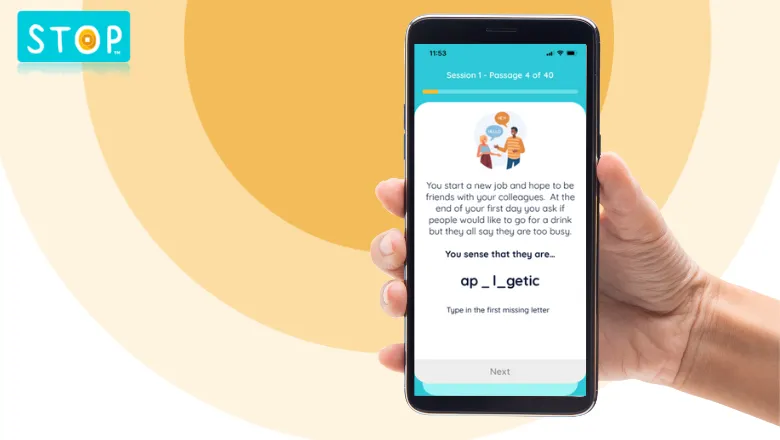We’re really excited about the potential of the STOP app to enable us to research this approach with more people and ultimately to widen access to potential new treatments to help people manage paranoia. Paranoia can be one of the most distressing psychological experiences. It can have a significant negative impact on peoples’ relationships, careers and mental health. Through STOP, we hope to make interventions for paranoia more accessible and engaging, helping thousands more patients to access care and making it easier for clinicians to provide timely support.
Professor Jenny Yiend, Chief Investigator on the STOP study and Professor of Cognitive Psychopathology at King's IoPPN
11 April 2023
New app could help more patients access treatment for psychosis
A team of academics and clinicians, led by King’s College London, are developing revolutionary technology to transform the way healthcare professionals can help patients with feelings of paranoia.

In a landmark project, experts from the Institute of Psychiatry, Psychology & Neuroscience (IoPPN) at King’s, University of Bath and The McPin Foundation are working with healthtech startup Avegen Health to develop and trial a new app that will deliver a therapy called STOP (Successful Treatment Of Paranoia), supported by the NIHR Maudsley Biomedical Research Centre. STOP therapy uses gamified activities and assessments, delivered weekly over twelve weeks, to give patients the tools to overcome paranoid thoughts.
Paranoia is thinking and feeling like you may come to harm even if there is no evidence, or very little evidence, that this will happen. As many as a third of us will experience paranoid thoughts in our lifetime and access to support from the NHS can be slow.
The research team behind STOP hope the new technology will be able to ease pressure on NHS services by making it easier for patients to get effective, timely and accessible remote therapy to help them manage their paranoid thoughts and prevent a decline in their mental health.
STOP therapy was developed from research findings on the thinking patterns that underpin paranoia, and combining this with established techniques that can change biases in how we think. A feasibility study of the therapy with about 60 participants has shown promising results, with improvements in symptoms of paranoia and a reduction in anxious and depressed mood. The partnership with Avegen Health will enable the therapy to be trialled as an app and with more patients.
The app will be tested by over 250 patients with distressing paranoid thoughts from any NHS Trust in the UK in a clinical trial funded by the Medical Research Council (MRC). The clinical trial opened to participants in October 2022 and will run for 24 months, closing to recruitment in August 2024. If it proves effective the app could be in the hands of patients as early as 2025.
Professor Yiend continues: “Working with Avegen to build the STOP app has been enjoyable. Avegen’s CEO Dr Nayan Kalnad and his team have supported us to bring a sophisticated, safe and innovative tool to life in a relatively short space of time, enabling us to get a clinical trial underway efficiently with the ultimate goal of getting the tool in the hands of the patients who need it as quickly as we can.”
How STOP works
STOP uses engaging videos, activities and assessments, delivered via a smartphone app, to target a psychological process called “biased interpretation of ambiguity”. Typically, this process means that people with paranoia will automatically interpret emotionally ambiguous situations in a negative way. But the new technology trains individuals to consider alternative ways of seeing situations, which can drive a reduction in distress-inducing paranoia symptoms. Sessions involve reading text that could be interpreted in a paranoid way (such as the stare of a stranger which could reflect harmful intentions) and encouraging readers to make the alternative interpretation (such as the stare reflecting harmless curiosity) by using word tasks and questions.
As part of the STOP treatment programme, patients will complete one therapy session in the app per week for twelve weeks, with each session taking around forty minutes to one hour to complete.
Dr Nayan Kalnad, former medical doctor and CEO and co-founder at Avegen Health, comments: “As a former medical doctor, I’m passionate about building technology that can take care beyond clinical settings and support patients to better manage their health in their day-to-day lives. So it has been a privilege to work on STOP: a tool that has immense potential to transform the quality of life of thousands of patients in the UK experiencing paranoia.
“STOP provides a blueprint for digital therapeutics to play an even bigger role in getting critical mental health care to patients, and easing pressure on doctors and the NHS."
For more information please contact:
- Franca Davenport, Communications and Engagement Manager (part-time), NIHR Maudsley Biomedical Research Centre, franca.davenport@kcl.ac.uk.
- Alex Booth, Communications and Engagement Manager (part-time), NIHR Maudsley Biomedical Research Centre, alex.booth@kcl.ac.uk.

